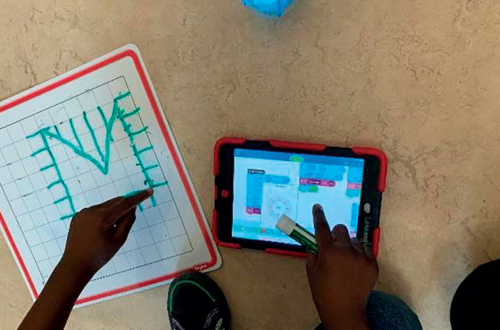I was thinking this week about the vastness of mathematics. Not only do we need to be fluent in the basics of mathematics, but we also need to recognize and use much more complicated mathematical ideas. I think of it as a spectrum—from the basics of operations to complex investigations into how mathematics works for us and applies to us and, furthermore, how we actually use mathematics and its related skills.
On the cover of this issue of delta-K, you will see one end of the spectrum, or perhaps the beginning, of mathematics. Throughout the issue, you will see more applications of mathematics, delving deeper into how much mathematics is woven into ideas around us, as well as some interesting and perplexing deeper mathematics and life situations that can be related to mathematics. We need to question, investigate and apply in our mathematical world today. There are so many truly interesting mathematical applications that we are only now starting to investigate. This field is growing at a very fast rate. We are seeing more connections and mathematical threads every day—if we look.
We know that there are big ideas in terms of mathematical concepts and content in mathematics. We also know that there are big process ideas that are part of the crucial goals in mathematics. When we think about the underlying procedural or process goals in mathematics that we want our students to reach, we see goals such as the following:
- Self-directed problem solving using a variety of strategies
- Effective mathematical communication
- Reasoning and generalization of connections and conclusions
- Fluency in situations that require the use of numbers
These goals take the so-called basics of mathematics and expand the scope of how we use them, throughout all content areas of mathematics.
When we think even deeper about what mathematics accomplishes, we can answer for our students the age-old question “When am I going to use this?” They will be using the process of problem solving as they investigate the best travel path and the costs for their holiday. They will be communicating, in a mathematical sense, when they sketch their kitchen with measurements for a home renovation project and set forth the materials needed and the cost. They will be reasoning, likely daily, through actions that must be taken in a multitude of situational contexts and the order of those actions, with likely consequences—all the while thinking through and reflecting on what has happened previously in a similar situation and rationalizing the worth. They will be using number sense as they examine their cellphone bill or pay stub for correctness. Wow! These are complex processes, and mathematics is the precursor to practicing them in life. That is a fundamental reason why we practice mathematics. (Of course, as mathematics teachers, we know that there is also a certain joy in learning the mathematics involved.)
Recently, I looked at a list of skills workers will need in 2020 (Beckford 2018; Gray 2016), based on a World Economic Forum (2016) report. The first two skills on the list are complex problem solving and critical think-ing. Does that sound familiar? Also, the seventh skill is judgment and decision making. When we work with our students on these big process ideas in our schools and through our content, students are practicing the skills they will need for the future. Mathematics is the venue we use to develop and practice those skills.
Mathematics has a truly important place in our world today, based on the sheer frequency with which we use it, create with it, evaluate with it and solve with it. Our challenge, as mathematics teachers, is to allow our students to practice these big process ideas in meaningful situations, questions and projects and to help them develop these skills so that they can transfer them to new situations. Even if this practice does not immediately present as a mathematical situation, the skills are still in place, and we work with students on how to transfer their applicability to a novel situation. Mathematics develops skills that are necessary for our students today.
This spectrum of mathematics has far-reaching implications, far beyond simply looking at the content we teach through the K–12 curriculum. It is how we let our students practice the needed skills through the content, knowing that these skills will emerge throughout life as a necessary element of how they walk through their day.
How can we purposefully and effectively give our students practice with these big process ideas and skills? What can you do this year to further develop these skills in your students? How can we help stu-dents see the intrinsic value of mathematics beyond what they may think it is on the surface?
References
Beckford, A. 2018. “The Skills You Need to Succeed in 2020.” Forbes.com, August 6. www.forbes.com/sites/ellevate/2018/08/06/the-skills-you-need-to-succeed-in-2020/ (accessed August 20, 2019).
Gray, A. 2016. “The 10 Skills You Need to Thrive in the Fourth Industrial Revolution.” World Economic Forum website, January 19. www.weforum.org/agenda/2016/01/the-10-skills-you-need-to-thrive-in-the-fourth-industrial-revolution/ (accessed August 20, 2019).
World Economic Forum. 2016. The Future of Jobs: Employment, Skills and Workforce Strategy for the Fourth Industrial Revolution. Global Challenge Insight Report. Geneva, Switzerland: World Economic Forum. Also available at www3.weforum.org/docs/WEF_Future_of_Jobs.pdf (accessed August 20, 2019).
Lorelei Boschman






